Larry A. Larson Speaker Series: Creating Flood Resilient Communities
The intent of this series, which is organized by the ASFPM Foundation, is to create opportunities for interaction among the nation’s thought leaders on flood risk reduction policy. Future events will maximize timely exposure to relevant discussions and debates on community-based flood risk management, an area of policy and practice that was notably shaped and influenced by Larson’s life work. This series will be of lasting benefit to foundation donors and event participants.
2024 - Floodplain Management in the Era of Big Data and Artificial Intelligence
Tuesday, October 23 from 3:45 PM - 5:00 PM
The ASFPM Foundation is excited to partner with the New Jersey Association for Floodplain Management (NJAFM) again to host the Larry A. Larson Speaker Series (LLSS) at the 2024 NJAFM Annual Conference. This year's LLSS event will focus on applying artificial intelligence to improve flood risk mitigation and resilience. The event will bring together representatives of federal and local government and industry to participate in a panel discussion on the implications of AI in this field. Current efforts, including pilot studies in Monmouth County, will be presented and a Questions and Answers session will be held.
The LLSS intends to create opportunities for interaction among the nation's thought leaders regarding flood risk reduction policy. Events maximize timely exposure to relevant discussions and debates on community-based flood risk management, an area of policy and practice that was notably shaped and influenced by Larry Larson's life work. This series is intended to be of lasting benefit to Foundation donors and event participants.
Panelists include:
Derrick Hiebert, Assistant Administrator, Hazard Mitigation Directorate, FEMA
Joe Barris, CFM, Director, Division of Planning, County of Monmouth (NJ)
Curtis Smith, PE, CFM, Senior Associate, Stantec
Moderator: Scott Edelman, Senior Vice President, AECOM
2019 - Increasing Our Resilience to Urban Flooding
The fifth annual Larry Larson Speaker Series event will be held Oct. 16, 2019, as a plenary session at the New Jersey Association for Flood Management's annual conference in Atlantic City, New Jersey. Building upon the outcomes of the 6th Assembly of the Gilbert F. White National Flood Policy Forum held in Washington, DC in March 2019, this Larson Speaker Series event will feature a panel discussion among national flood policy experts on the issue of urban flooding hazards and mitigation strategies.
Panelists: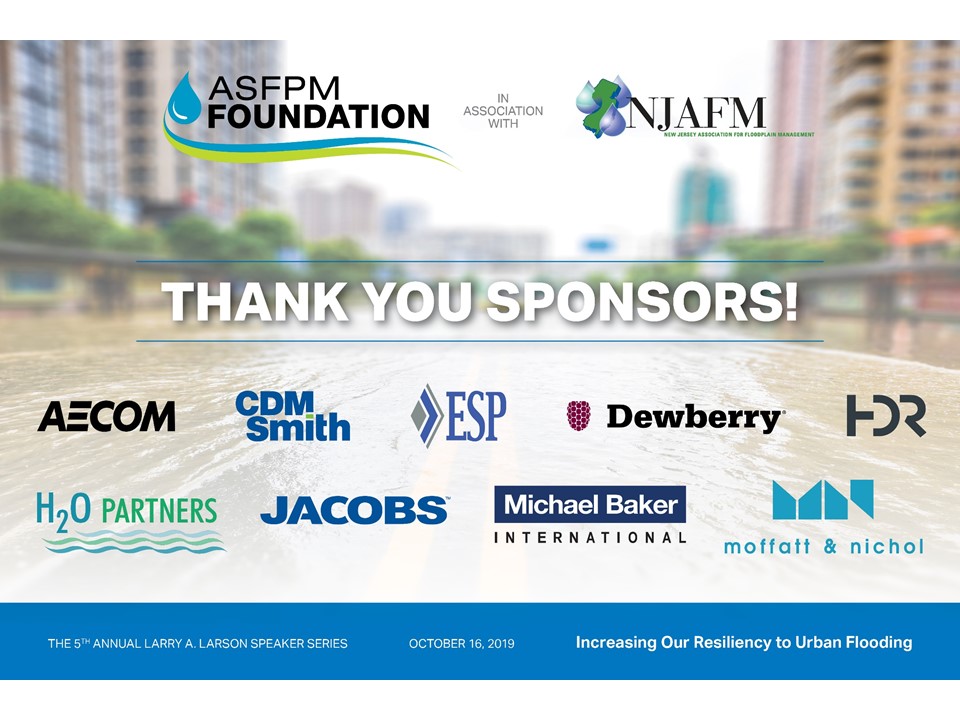
- Doug Plasencia, PE, CFM, Moffatt & Nichol (ASFPM Foundation President), "Increasing our Resiliency to Urban Flooding" – Gilbert F. White National Flood Policy Forum Report
- Gerry Galloway, Ph.D., P.E., University of Maryland (ASFPM Foundation Trustee), "The Growing Threat of Urban Flooding: A National Challenge" – Texas A&M/University of Maryland
- Chad Berginnis, CFM, ASFPM (ASFPM Foundation Secretary) "Framing the Challenge of Urban Flooding in the United States" – National Academy of Sciences
Moderator: Molly O’Toole, Molly O’Toole & Associates, LTD (ASFPM Foundation Executive Board)
2018 - Big Data = Big Future + Big Challenges
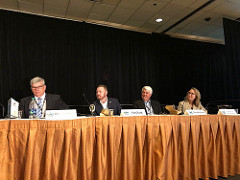 The fourth annual Larson Speaker Series event was held on Sept. 5, 2018, as a plenary session at the Floodplain Management Association's Annual Conference held in Reno, Nevada. The keynote speaker was Daniel Cotter (far left), director of the First Responders Group in the Science and Technology Directorate, U.S. Department of Homeland Security. Cotter was joined by a panel of experts (left to right) including Edward Clark from NOAA National Water Center; David Ford from HDR/David Ford Consulting; and Samantha Medlock from Willis Towers Watson. More than 350 conference participants attended this event.
The fourth annual Larson Speaker Series event was held on Sept. 5, 2018, as a plenary session at the Floodplain Management Association's Annual Conference held in Reno, Nevada. The keynote speaker was Daniel Cotter (far left), director of the First Responders Group in the Science and Technology Directorate, U.S. Department of Homeland Security. Cotter was joined by a panel of experts (left to right) including Edward Clark from NOAA National Water Center; David Ford from HDR/David Ford Consulting; and Samantha Medlock from Willis Towers Watson. More than 350 conference participants attended this event.
Big data methodologies are being used increasingly to provide flood risk information at scales ranging from the community level to the entire nation. It represents the use of large volumes of structured and unstructured data, analyzed and manipulated to capture trends or observations that might be considered meaningful. At its simplest form, it can range from leveraging massive geospatially referenced data sets into physical models, to using data analytic tools searching for trends in equally massive data sets.
Recently, big data solutions have been applied to flood risk identification, providing data analytics and results in new ways, and with notable consequences. Potential applications include determination of flood risk, informing of insurance ratings, flood forecasting, investment modeling, post-event damage assessments, post-event planning analytics, and other uses. Each of these applications can have profound consequences for the end users and the public. Challenges include assumptions made with incomplete data, appropriate reporting of results, sensationalizing of headlines, understanding of the limitations of specific results, the proper role of professional engineers in risk data that impact public safety, and what investments must be made to improve big data usage in the future. A recent application of big data for flood risk uses has signaled potential downgrade of future municipal bonds for high risk areas, while in another recent instance, there were serious concerns about the results and what they suggested. Furthermore, when entities developing these data sets are asked to explain assumptions, 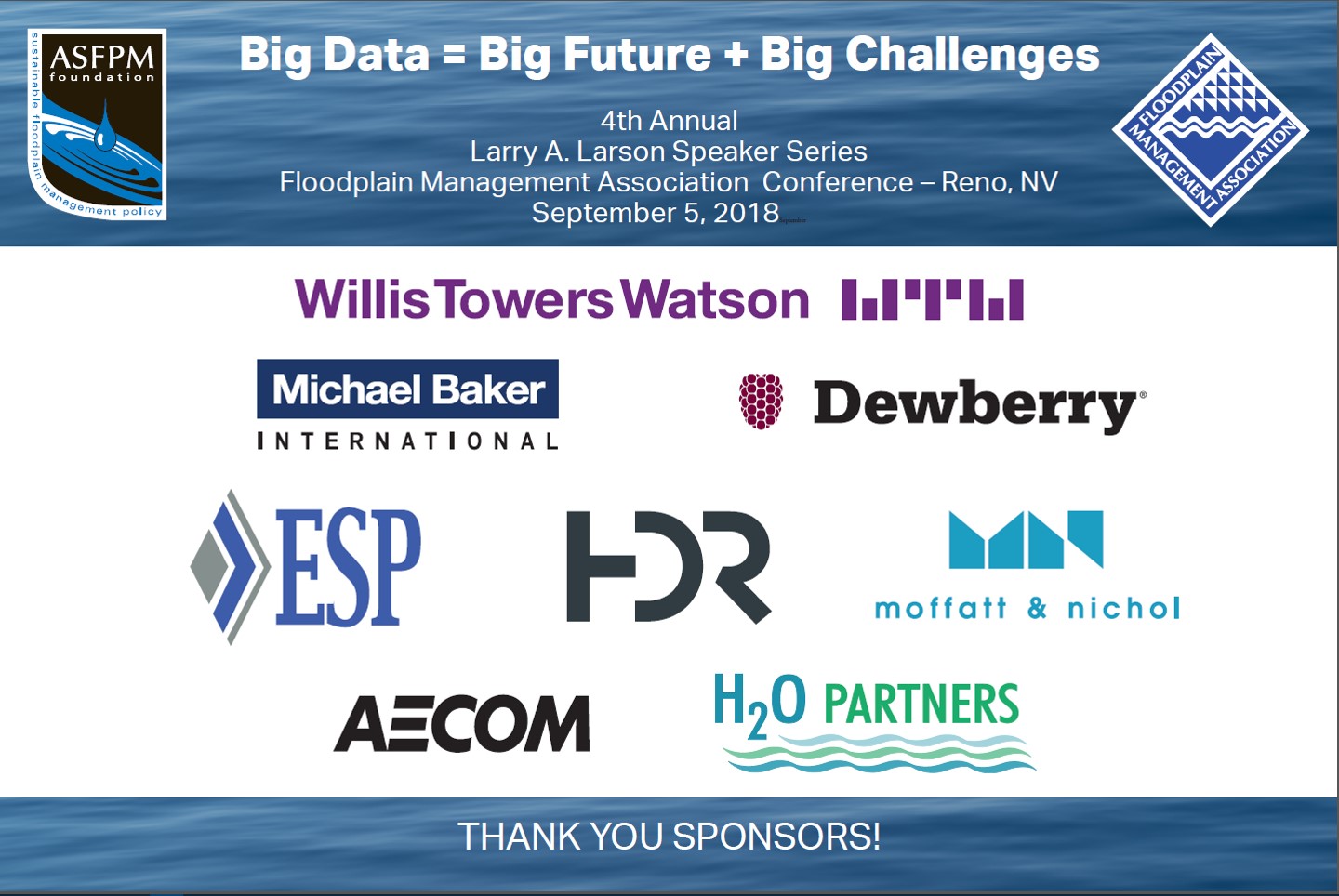 quite often there is little to no res-ponse or proprietary analyses are claimed, preventing full transparency into the development and reporting of results.
quite often there is little to no res-ponse or proprietary analyses are claimed, preventing full transparency into the development and reporting of results.
The purpose of this plenary session was to start a discussion on the ben-efits, risks, and challenges associated with the use of big data in flood risk identification and flood risk management. This plenary session was presented by the ASFPM Foundation in collaboration with FMA, as part of the foundation’s Larry A. Larson Speaker Series. Thank you to our sponsors and to FMA for making this event possible.
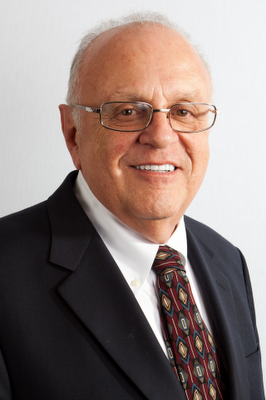
2017 - Floodplain Management and Community Resilience in a World with Changing Contextual Factors
The 2017 Speaker Series was held in conjunction with the 42nd Annual Natural Hazards Research and Applications Workshop. Dr. Dennis Mileti, professor emeritus of sociology at the University of Colorado Boulder and director emeritus of the Natural Hazards Center was the featured speaker for the third annual Larry Larson Speaker Series event held on July 9, 2017. The 90-minute program began at 7 p.m. with a presentation by the keynote speaker followed by a facilitated panel and audience discussion. Dr. Mileti discussed and highlighted his observations of how community factors such as connectedness, political climate, resources and catalysts can impact floodplain management and community resilience.
2016 - Effective Coastal Adaption Requires Getting a Fix on Sea-level Rise
Dr. Don Boesch, professor and president of the University of Maryland Center for Environmental Science and vice chancellor for environmental sustainability for the University System of Maryland, was the featured speaker for the second annual Larson Speaker Series event. This event was held October 6 at the NOAA Center for Weather and Climate Prediction (Ground Floor Main Lobby, 5830 University Research Court, College Park, MD). The program also honored NOAA’s Margaret A. Davidson for her career-long contributions serving coastal resource management needs across the nation. The NOAA Center for Weather and Climate Prediction was the selected location due to the strong ties between NOAA, ASFPM Foundation and ASFPM. Here is a video of Boesch's presentation.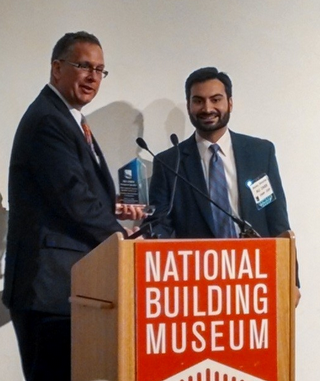
2015 - Protecting Federal Investments through National Flood Risk Management Standards
The inaugural event, which more than 60 attended, featured Ali Zaidi, associate director for Natural Resources, Energy and Science Programs in the Office of Management and Budget, Executive Office of the President. His speech, "Protecting Federal Investments through National Flood Risk Management Standards,” highlighted the administration’s efforts with partners to reduce the costs and suffering from floods. The event was held March 17, 2015 at the National Building Museum in Washington D.C.





